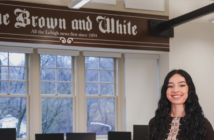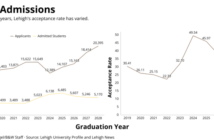Almost four years ago I was accepted early decision to Lehigh.
The Sunday after I chased my mailman down for the acceptance letter, I sat at the table for our weekly family dinner. That night, I proudly wore brown and white for the first time, unaware of the meaning those words would come to have over the next four years.
My grandfather, a Lehigh alumnus, looked at me and said, “You should write for The Brown and White. I was the business manager, you know.”
It seemed like a fine idea. I’d loved to read and write since first grade. But as a 17-year-old aspiring business major who had just been admitted to her dream school, Lehigh’s student newspaper wasn’t my first priority. I nodded and told him I’d definitely look into it. We had that same conversation several times over the next eight months before I left for school in August.
The rest happened pretty quickly. Like most first-year students, I attended the club fair for free stuff, but I also apprehensively signed my name on the list to become a writer for The Brown and White. I called home that afternoon and reported to my mom what I had done and asked her to pass along the message to my grandfather.
Then came the Journalism 1 introduction meetings, the reporting crash course and that first lonely, terrifying trip up three flights of stairs to the newsroom in Coppee Hall. I’ll never forget standing quietly in the doorway when the editors asked me for my staff preference. They laughed in my face when I said Lifestyle – and I’m still not sure why. When I completed my first story assignment, I immediately scanned the published version with my submitted draft to see what changes the editors had made, eager to assess how well I had done. I even sought extra assignments in an effort to show my interest. At the end of the semester, I applied to be an assistant news editor.
Three years later, I sit here writing my sixth and final edit desk. This issue of The Brown and White marks the end of my tenure as its editor in chief.
Much has transpired since freshman year. After a semester in the business school and writing for The Brown and White, I decided I wanted more than a business degree. I wanted a journalism degree, too. There were some obstacles to overcome — like the 150 credits required for graduation I’m still not sure I’ve completed — but the journalism department reassured me that my goal was achievable.
Beyond my academic pursuits, my various roles with the newspaper have always been my top priority. Because being an editor for the student newspaper isn’t a means to an end. It’s more than a resume-builder. It’s even more than sending the final version to print at the end of 12 (or more) exhausting hours. It’s more than breaking news. It’s more than investigating, interviewing, writing and editing.
It’s about giving a voice to those who wouldn’t otherwise have one. It’s about becoming an active member of your community. It’s about growing up and becoming a leader. It’s about standing behind your purpose even in the wake of conflict, criticism and misconception.
Our news media is held in contempt. In a 2014 Gallup poll, only four in 10 Americans said they trust the media to report the news fully, accurately and fairly — a critical low point for the industry. But few institutions as large and powerful as the media can completely escape skepticism, but for journalists, the criticism is directly in conflict with the mission.
I recently saw the movie Spotlight about a team of investigative journalists — including former Brown and White — editor in chief Marty Baron, at The Boston Globe who exposed a massive clergy sex scandal. I’ve seen enough movies featuring reporters, editors and the media to know that this one felt honest. It was a story portraying the hard work, dedication and commitment to telling the stories that are most difficult to tell.
I’ve had a chance to do that for The Brown and White. I’ve met with the director of pediatrics of the Lehigh Valley Health Network for a story about childhood cancer. I’ve traveled across the country to learn from the most innovative journalists in the country. I’ve led the editorial team to break stories ahead of professional local media outlets. I’ve been part of a transformation that truly made The Brown and White a trusted community news source.
But this experience — in all of its excitement, stress, learning and pride — is inevitably coming to an end. Next semester I’ll miss the newsroom. But I’ll have an opportunity to coach and advise young writers to become as passionate about journalism as I have.
Without the guidance from my older peers, my role models — who jokingly tell me they “made me,” who patiently taught me InDesign, who talked me through edit desk topics and who allowed me to watch over their shoulders as they submitted the paper every Wednesday and Sunday — I would not know what I know today.
They realized The Brown and White was more than just a newspaper. I’ve been lucky enough to realize it, too.





Comment policy
Comments posted to The Brown and White website are reviewed by a moderator before being approved. Incendiary speech or harassing language, including comments targeted at individuals, may be deemed unacceptable and not published. Spam and other soliciting will also be declined.
The Brown and White also reserves the right to not publish entirely anonymous comments.
1 Comment
This column is a wonderful tribute to student journalism — and to a fine student journalist whose voice will be missed at Lehigh.